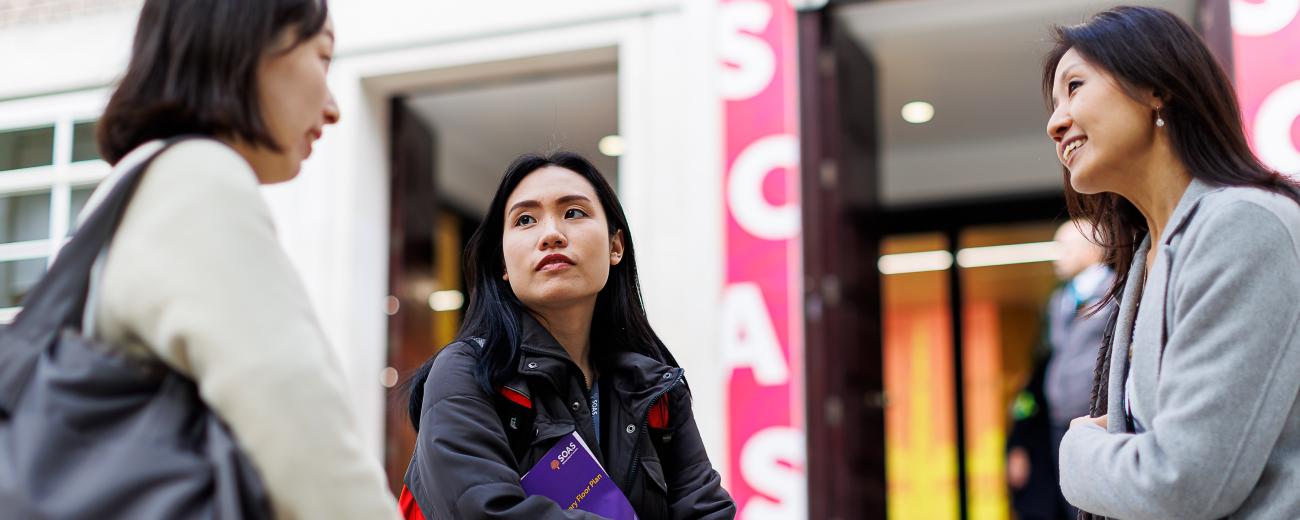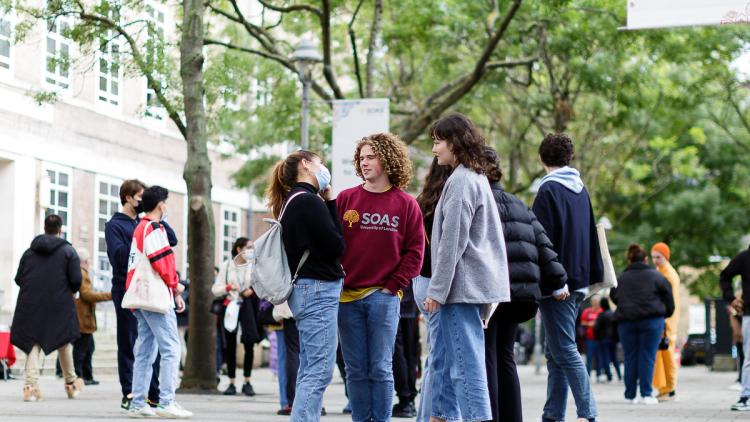Pre-arrival essentials


Please find your pre-arrival checklist to help you prepare for studying at SOAS.
Visas
If you do not have an immigration status that permits study in the UK, you will need a Student Visa. For information on the different kinds of student visas and whether you need one, visit UK Visas and Immigration.
If you need a visa to study in the UK and are staying for more than 6 months, you will have to pay an immigration and health surcharge as part of your visa application. This will entitle you to healthcare from the UK National Health Service (NHS) after registering with a doctor. (Visas and Immigration)
Booking your travel
We recommend you pay extra attention to the following if you’re booking tickets to travel, particularly when traveling by plane:
- Make sure you understand your rights to amend or cancel any bookings if needed.
- Each airline differs in the amount of free baggage you can travel with so make sure you check your baggage allowance before booking.
- The electronic devices and electrical items you’re allowed to take on a flight depend on your country of departure. Some airlines might also have different restrictions.
- Check with your airline before you travel if you’re not sure about what you can take as hand luggage. This also applies to things like laptops, phones, and vapes.
- Make sure you check the airport codes match the airport you want to land in to ensure that you land in the right place — London has 5 major airports:
- London City
- London Gatwick
- London Heathrow
- London Luton
- London Stansted
- Visit the airport’s website for information on how to get to your final destination from there. There will be a choice of buses, trains, and taxis.
Packing
Most clothing and household items such as bedding and cooking utensils can be bought cheaply when you arrive in London as well as online, so pack lightly and don’t ship or mail too many personal belongings as this may be more expensive than buying what you need when you arrive.
Note that UK appliances are fitted with a 3-pin plug. If you’re from another country that uses lower voltage than the UK average of 230v, you may also need a transformer — they are easy to find once you arrive.
There are strict governmental controls on what you can bring into the UK. Some things you can only bring limited quantities of — for example, alcohol and tobacco — so check the government’s website for details.
For further advice on moving to London please visit UCAS' A big list of absolutely everything you need to take to university and SavetheStudent's What to take to university checklist.
Accommodation
SOAS offers a wide range of accommodation and has a number of partnerships of available student accommodations across London. Find out more about
How to register with a GP
You should register with a doctor near your new home so you can get to them easily if you need medical attention. Visits to the doctor and emergency treatment are free for those registered with the NHS, however, you may be required to pay a fee for any medication, or treatment for any pre-existing conditions.
- For emergencies, either call 999 and ask for an ambulance or go to the nearest Accident and Emergency (A&E) department in one of the hospitals.
- For non-emergencies, call 111; they will give you professional advice and make you an appointment with your doctor or nearest walk-in Centre.
If you have a recurring health problem that requires treatments, you should bring a supply of medication and a note from your doctor at home so your doctor in London can help you as effectively as possible.
If you’re from outside the UK, you should also consider additional medical insurance, as there are restrictions on what treatment can be provided for existing health problems. Furthermore, UK treatments may not be the same as the treatments in other countries.
Books and Materials
Some specialist courses might give you the kit list so you can buy things in advance if necessary. For most, you don’t need anything beforehand and you will be given a book and course supply list during the first week of classes.
Your tutor can also tell you about shops that sell affordable supplies and materials. You should have a laptop suitable for the type, of course, you are doing, for example, a more powerful one if you're the course is more media/digital focused.
You can also borrow laptops from the SOAS Library and if you are experiencing financial hardship, you may be able to apply for financial support to buy equipment
Keeping in touch
There are several mobile phone plans to choose from — shop around when you are deciding on the best option for you:
- Pay Monthly: you’ll need to sign a contract for a fixed length of time, usually 12 to 24 months.
- Pay As You Go: you’ll just need to top up / buy credit as and when you need it.
- SIM-only: like Pay Monthly but you’ll only be committed to a rolling 30-day contract and won’t get a mobile device.
Calling international numbers from the UK can be expensive, especially if you use your mobile. Some alternative ways to stay in touch with people overseas include Skype, WeChat, Facebook Messenger, or WhatsApp to make calls and send messages.
You can also consider including an international calling plan when you get a UK mobile. You can buy international calling cards from most local shops and many have a freephone number you can access to place a call; if your mobile phone plan charges for calling free phone numbers, use a landline or public telephones.
Traveling around London
With a Student Oyster photocard, you will save 30% of the price of a Travelcard and Us Pass, available to buy for daily, weekly, and monthly use. You can only apply for a Student Oyster photocard through the TFL website after you’ve been given a student identification number at enrolment. You’ll need a digital photo of yourself, your course starts and end dates, your email address, and a bank card to pay the £20 fee.
You might also be able to apply for one of a range of National Railcards which offer discounts on Tube, DLR, LondonOverground, TfL Rail, and National Rail services.
Opening a Bank Account
If you don’t have a UK bank account already, you should bring some money with you to use during your first few weeks as it takes time to set up. You could also consider using an online bank whilst waiting for your UK bank account to be set up. To open a bank account, you’ll need some, or all, of the following:
- Proof of your address (in your home country if you’re from overseas).
- Proof of your UK address, e.g. your accommodation contract.
- A ‘bank letter’ from SOAS. You can request this from the Student Information Desk (SID), but only after you enroll. You will need to provide us with the name and address of your chosen bank.
- Your passport and UK immigration permission if relevant.
There's also the option of opening an app-based account which may be quicker and need fewer documents. We don't recommend any bank in particular so it's important to do your own research on which bank or building society is right for you.

